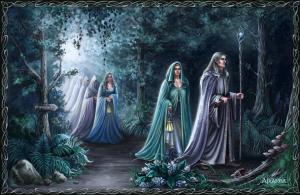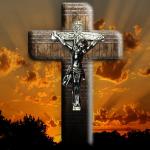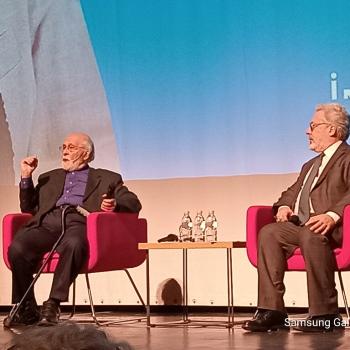
Tolkien, like his friend C.S. Lewis, contemplated the notion of “unfallen” beings living in a fallen universe. He thought that if they existed, even though they were not tainted by sin, they would still be affected by the fall. It was with this understanding that wrote concerning the Quendi, the Elves, in his writings:
The Quendi never “fell” in the sense that Men did. Being “tainted” with the Shadow (as perhaps even the Valar in some degree were, with all things in “Arda Marred”) they could do wrong. But they never rejected Eru, or worshiped Melkor (or Sauron) either individually, or in groups, or as a whole people. Their lives, therefore, came under no general curse or diminishment, and their “life-span”, co-extensive with the remainder of the life of Arda, was unaltered – except only insofar as, with the very ageing of Arda itself, their primitive vigour of body steadily waned. [1]
Since the corruption of sin affected the world at large, all who are a part of the world would find themselves touched by it. Even unfallen beings could do wrong (and so fall into particular, but not universal, sin). More importantly, their connection with a world in which the fall took place would have an effect on their lives. The Quendi felt this in the way they were associated with their bodies; in youth, their bodies are strong and vigorous but as they aged, their spirit grew in strength and out of harmony with their body and all material being. Their bodies would grow weak and their spirit would grow strong. They would become more and more spirit like until, at last, they would seem to vanish from the world itself. They would have to exert themselves in order to engage their physical nature. They would always possess a material nature and a tie to the world at large, no matter how spiritualized they had become. Their fate was tied with the fate of the world. They would continue to live until the end of time, even if their presence would not be so readily perceived by others. In this way, the sins of others tainted the world, and through their connection with the world, created a disharmony in their very being. It was not their own sin, but the sins of others which did this. They were established to be in and of the world. Their ultimate fate, however, was not known by them, because the fate of the world in the eschaton was not known by them:
Another thing which distinguishes the living from the unliving is that the living employ Time in their realization. In other words it is part of their nature to ‘grow”, using such material as is needed or is available to them for their embodiment. So that a living pattern does not fully exist at any one moment of time (as do unliving patterns); but is complete only with the completion of its life. It cannot therefore rightly be seen instantly, and is only imperfectly envisages even with the help of memory. Only those who conceived its pattern and whose sight is not limited to the succession of time can, for instance, see the true shape of a tree. [2]
The completion of their life, unless it was unnaturally brought to an end (such as through violence) would be with the end of the world itself. This is why their destiny could not and would not be known until the end of time. For they existed with the world, and their destiny was intricately tied to the destiny of the world, but the destiny of the world was full of unexpected surprises which only Eru (God) knew. Only those outside of time, only those who have already seen what happens in the end, would know their fate. This they and others often asked if they would perish when time came to an end, or if Eru, God, had some other destiny for them. This was a question which concerned them and though they had speculations and guesses, they could not provide any final, authoritative answer to the question. Tolkien was interested in offering a way to explain the presence of the Elves in the past while acknowledging their general disappearance in the present.
In a slightly reformulated exploration from what was quoted above, Tolkien made it clear, sin was an issue; sin had corrupted the world and so those connected to the world, whether or not they were fallen beings, would feel the effects of such sin in their own lives
The Quendi never “fell” as a race – not in the sense in which they and Men find themselves believed that the Second Children had “fallen.” Being “tainted” with the Marring (which affected all the “flesh of Arda” from which their hröar was derived and were nourished), and having also come under the Shadow of Melkor before their Finding and rescue, they could individually do wrong. But they never (not even the wrong-doers) rejected Eru, not worshiped either Melkor or Sauron as a god – neither individually or as a whole people. [3]
What is interesting is the way Tolkien viewed the possibility of unfallen beings as being affected by sin. He believed individuals within an unfallen group could do wrong, they could sin, but whatever they did would not affect the group as a whole in the way original sins did with humanity. Thus, he thought that someone living in the world without sin could still feel the wounds of sin upon their lives, but if they did, it must not be asserted that they did so because they themselves were fallen creatures. This is an important observation and distinction which, if employed theologically, could offer insight into the various traditions surrounding Mary, the Theotokos.
Mary, through special grace, knew no sin in her life. This did not mean she would be free from the effects of sin in her life. Following Tolkien, we could say, because she lived in the world, a world touched by sin, she could and would suffer because sin continued to influence the world and what happened in it. Indeed, she shared with the rest of humanity the conditions put upon its historical existence as a result of the fall. This is why she could and would eventually die; her death was not due to any sin she committed, for she was without sin, but due to her ties with the rest of humanity; indeed, it would seem, from the way various theologians and saints have presented her death, in solidarity with the rest of humanity, she accepted death for herself even though she knew no sin. [4]
This is also why Jesus could also die without knowing sin. He took on human nature, which itself is good and pure, but he took it with the way history had formed and shaped it. He took on a role in human history, a history influenced by and shaped by the effects of sin upon the world. He came to be in solidarity with us all, to experience the effects of sin upon himself. He bore sin upon himself without knowing sin. “ He himself bore our sins in his body on the tree, that we might die to sin and live to righteousness. By his wounds you have been healed” (1 Ptr. 2:24 RSV). And thus, he who knew sin could “become sin” in the sense he took upon himself a human life and death and assumed for himself in his humanity the effects of sin upon himself. “For our sake he made him to be sin who knew no sin, so that in him we might become the righteousness of God” (2 Cor. 5:21 RSV). It was in this fashion that he could and would experience the full effects of sin – all the way unto death and into the realm of the dead, engaging all that was touched by sin in and through his own being; then, having done so, he could and would reconfigure the world.
Even if we do not believe Elves, even if we understand all that Tolkien wrote was fiction, he tried to provide ways it could, in theory, be true and relate to the world which we lived in, indeed, to the Christian faith. This allowed him to pursue categories of being which we rarely consider. What exactly would be the experience of an unfallen being in the world. Could they suffer, could they die, could they, also, somehow deny their own goodness and sin? Lewis, of course, explored this theme in the Space Trilogy, but Tolkien did not think we needed to leave the Earth to raise these questions and consider the possibility of such a life existing here with us on the Earth. In doing so, he suggested that such unfallen creatures could and still would be affected by the taint of the “Shadow,” the taint of sin. Once humanity had fallen into sin, once the world was marred by the effects of sin, even sinless people (Mary and Jesus) could and would feel the effects of sin upon them even if they knew no sin themselves. They could and would die, despite their sinlessness. If Jesus, the God-man, could not do so, then there would have been no way for him to overcome death by death itself. Then sin and death would have had the final say. Thus, Tolkien was correct in making the observation that those without sin could and would still feel the effects of sin in their lives so long as they lived in a world marred by sin. Though death can be said to be one of the effects of the fall upon creation, this does not mean all who die are sinners, which is why Mary, though she died, did not die because of any sin on her part but rather because of her unity with the rest of humanity (and the world at large).
[1] J.R.R. Tolkien, “The Awakening of the Quendi,” in The Nature of Middle Earth. Ed. Carl F. Hostetter (Boston: Houghton Mifflin, 2021), 36.
[2] J.R.R. Tolkien, “Elvish Reincarnation,” in The Nature of Middle Earth. Ed. Carl F. Hostetter (Boston: Houghton Mifflin, 2021), 254.
[3] J.R.R. Tolkien, “Concerning the Quendi,” in The Nature of Middle Earth. Ed. Carl F. Hostetter (Boston: Houghton Mifflin, 2021), 88.
[4] While she knew no sin since birth, she still had to be open to grace, so that she could receive grace upon grace, to grow in grace. This is why it is said that at the annunciation, after her acceptance of what the angel had told her, the Hoy Spirit embraced her and gave her more, indeed, greater grace than she had before, making her ready to fulfill her role as the Theotokos. Thus, we are shown, the grace needed to be pure is less than the grace which is offered to all of us, for we are called to grow in grace, to become greater through grace than we are by nature, and when we do, we will find the Spirit overshadowing us as it did Mary and helping us give a spiritual birth to Christ in our lives.
Stay in touch! Like A Little Bit of Nothing on Facebook.
If you liked what you read, please consider sharing it with your friends and family!













